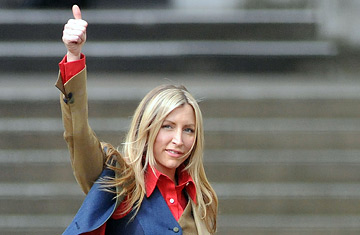
Heather Mills has been awarded £24.3m in her divorce settlement with Sir Paul McCartney.
It's reasonable to suppose that Heather Mills isn't the world's greatest Beatles fan, but today she might well believe in yesterday. Less than 24 hours after she emerged from London's Royal Courts of Justice to pronounce herself "very, very happy" with her 24.3 million pound ($49 million) divorce settlement from Paul McCartney, she failed in a bid to stop the judge who decided the award from publishing his reasons for doing so. She said she was appealing against publication to protect the privacy of her four-year-old daughter Beatrice, apparently the only positive issue of the less-than-four-year union of Mills and McCartney. She needn't have worried about Beatrice. The 58-page document written by the judge, Justice Hugh Bennett, contains little personal detail about her daughter, apart from McCartney's plea that the child should enjoy a normal life. "It is not healthy for a child to have security 24/7. It sets them apart from their peers and makes them an object of curiosity and, at times, ridicule," he said in his submission to the court. "Such children live in gilded cages. I do not want that for Beatrice."
But there are other revelations in the document — and it's Mills herself who is cast in the harshest light. "The husband's evidence was, in my judgment, balanced," writes Bennett. "He expressed himself moderately, though at times with justifiable irritation, if not anger. He was consistent, accurate and honest." Bennett regrets he cannot say the same about Mills. "Much of her evidence, both written and oral, was not just inconsistent and inaccurate, but also less than candid."
If so, then dishonesty sometimes pays. Mills, a former lingerie model who lost part of her leg in a 1993 road accident, will receive a lump sum of 16.5 million pounds plus properties worth a further 7.8 million. Since McCartney first filed for divorce from Mills in July 2006, the world's media has done its best to cover the case, even though the proceedings were held in private. Despite her protestations of contentment at the outcome, Mills can't have enjoyed listening to the judgment. True, she emerged with a greater slice of his 400 million pound assets than the musician felt appropriate. McCartney originally proposed giving Mills 15.8 million pounds. But she had asked for a whopping 125 million. Her expectations — and her reputation — have taken a battering.
Indeed, the judge's characterization of Mills is, while politely couched, not flattering. To her argument that she brought substantial wealth into the marriage, Bennett points out that she inflated the value of her property (a 500,000 pound apartment, for example, really costing only 385,000 pounds — and that in the middle of a real estate boom). Nor do the facts, as Bennett sees them, support Mills' version of the romance, in which she says she helped rehabilitate a broken and importunate McCartney, mourning his late wife Linda. (For example, the formality with which the ex-Beatle loaned Mills money, the judge wrote, belied a seamless emotional bond). He also wrote: "The wife for her part must have felt rather swept off her feet by a man as famous as the husband. I think this may well have warped her perception leading her to indulge in make-believe. The objective facts simply do not support her case."
The judge decided to ignore any claims of bad conduct made by either party on the ground that such claims were irrelevant. Still, many of the claims and counter-claims about what Bennett calls "a campaign of harassment and vilification" that Mills and McCartney each accused the other of waging are detailed in his judgment, with murky tales of telephone tapping and private court documents being leaked to the media. These claims are likely to be hashed over in detail during separate libel actions relating to stories based on such leaks.
In the end, Bennett based his decision on McCartney's and Mills' contributions to the marriage and on their future needs. Mills claimed that McCartney stopped her from pursuing a U.S. television career, including work on the Larry King show, which "would have made millions." Bennett doesn't mince words. "I am prepared to assume in the wife's favour that Larry King did float the idea of the wife doing further interviews on his show. But I doubt it got any further than that."
Bennett's conclusion: that Mills' "association with the husband advanced, not stultified, her career." Nevertheless, after a detailed, almost actuarial calculation of her prospects and needs, he awarded her the 24.3 million pounds, much less than what she demanded but a still substantial award. "I've had worse press than a pedophile or a murderer and I've done nothing but charity for 20 years," Mills complained in a broadcast interview last year. The detailed court judgment is unlikely to improve her public image, but may not harm her future prospects. There's no such thing as bad publicity, according to the old adage, and in the short term, Mills appears to have cornered that market.With reporting by Eben Harrell/London
